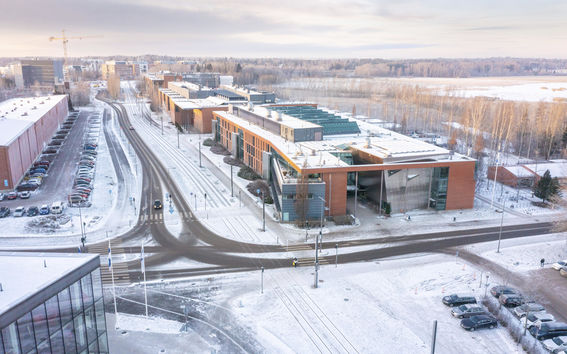Energy efficiency is a key theme in new projects funded by the Academy of Finland

The Academy of Finland has granted funding to ten projects researching the sustainability and energy efficiency of future ICT solutions. The funding, granted under the research, development and innovation programme ICT 2023, comes to a total of 6.85 million euros. Eight researchers from Aalto University School of Electrical Engineering and School of Science received a total of more than two million euros for five different projects.
WALLPAPER is the consortium between four professors: Riku Jäntti, Caterina Soldano, Ville Viikari and Jyri Hämäläinen. Application was ranked 1st of all 39 applications in the ICT 2023 call.
WALLPAPER aims to develop a reconfigurable intelligent surface (RIS) to improve the energy efficiency of existing and future wireless systems and, at the same time, offer a sustainable solution for being manufactured with organic and recyclable materials, thus reducing the impact on the worldwide e-waste.
Professor Juho Kannala's project develops computational approaches for energy-efficient machine perception systems for the machines of the future. Research is needed to enable computer vision and artificial intelligence methods to respond to the shift in transforming industries, such as electrification of vehicles and working machines, towards energy-efficient and sustainable operations in the long term.
Professor Mikko Kivelä's CON-NET project is developing machine learning methods for detecting, understanding and mitigating trends, signals and suspicious behaviour and misbehaving entities online. The CON-NET project will exploit multi-level networks and create an online platform for visualising these multi-level networks, which will allow end-users to better understand the sources and effects of online misbehaviour.
Professor Joni Pajarinen goal of the project is to avoid chip waste. Hardware accelerators can significantly improve energy efficiency for tasks such as AI, network processing, physics simulation, or cryptography. However, with the high pace in algorithm development, the existing fixed function accelerators quickly become chip waste. Research aims to avoid chip waste and automate the generation of reusable programmable hardware accelerators using reinforcement learning methods.
Professor Patrick Rinke is working on AI-software-based material design for sustainable artificial intelligence hardware (AI4AI). The project will develop new neuromorphic -- or brain-like -- AI hardware using conventional AI methods. This type of AI consumes much less power than traditional AI with conventional chips and is therefore a better option for the environment. The project is led by Sayani Majumdar, Professor of Industrial Life at VTT.
Professor Zhipei Sun project with Professor Nonappa from Tampere University aims to develop high-performance photonics from wood. We expect the combination of photonics and wood in this joint project to offer sustainable and energy-efficient solutions to some photonics and optoelectronic applications.
Press Release: Academy of Finland
Read more news

Significant donation to boost pavement engineering research and education
Companies and associations in the field have donated €400,000 to the School of Engineering.
‘Mesoscale’ swimmers could pave way for drug delivery robots inside the body
Researchers have discovered how tiny organisms break the laws of physics to swim faster — such secrets of mesoscale physics and fluid dynamics can offer entirely new pathways for engineering and medicine.
Design strengthens industrial competitiveness – human-centered factory work at the core
Factory work is undergoing a transformation: new technologies and artificial intelligence are changing the content and roles of work. Aalto University’s Department of Design is studying this change from a human-centered perspective in the HiFive project.






